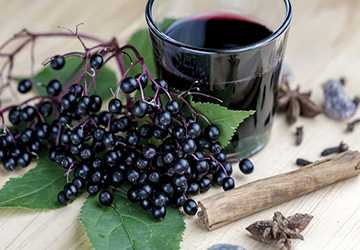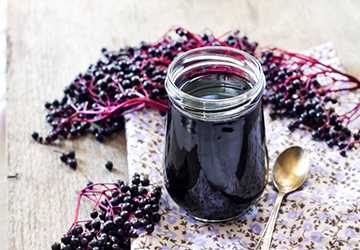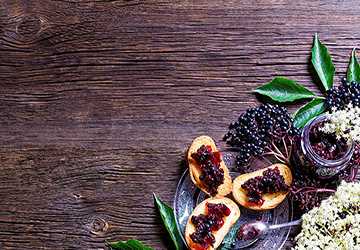14 Health Benefits of Elderberry
Author: Odin Bernard
Elderberry is one of the most commonly used medicinal plants in the world. Traditionally, Native Americans used it to treat infections, while ancient Egyptians used it to improve skin tone and heal burns. It is still collected and used in folk medicine in many parts of Europe.
Today, elderberry is most commonly used as a dietary supplement to treat cold and flu symptoms.
However, the plant's raw berries, bark, and leaves are also poisonous and can cause an upset stomach. In the past, flowers and leaves were used to relieve pain, swelling, and inflammation and to stimulate urine production and sweating. The bark is used as a diuretic, laxative, and emetic. In folk medicine, dried berries or juice are used to treat flu, infection, sciatica, headache, toothache, heartache, and neuralgia, as well as as a laxative and diuretic. Additionally, the berries can be boiled and used to make juices, jams, chutneys, cakes, and elderberry wine. The flowers are often cooked with sugar to make sweet syrup or tea. They can also be eaten fresh in salads.
There are many reports of the benefits of elderberry. They are packed with nutrients and can help fight cold and flu symptoms, support heart health, fight inflammation and infection, and more. Elderberries and flowers are rich in antioxidants and vitamins that can boost your immune system. They can help curb inflammation, reduce stress, and help protect your heart. Some experts recommend using elderberries to prevent and relieve cold and flu symptoms.

1. Rich nutrition
Elderberries are a low-calorie food rich in antioxidants. They also have many nutritional benefits. Elderberries are:
lHigh vitamin C content: Every 100 grams of fruit contains 6-35 mg of vitamin C, accounting for 60% of the daily recommended intake.
lHigh fiber: Every 100 grams of fresh berries contains 7 grams of fiber, more than a quarter of the daily recommended intake.
Good source of phenolic acids: These compounds are potent antioxidants that help reduce damage caused by oxidative stress in the body.
Good source of flavonols: Elderberries contain the antioxidant flavonols quercetin, kaempferol, and isorhamnetin. Flowers contain ten times more flavonoids than berries.
lRich in anthocyanins: These compounds give the fruit its unique deep black-purple color and are a powerful antioxidant with anti-inflammatory properties.
While there's no one-size-fits-all, elderberry advocates say the fruit is one of nature's most versatile solutions to ailments.
2. It May Improve Cold and Flu Symptoms
Black elderberry extract and flower infusion have been shown to reduce the severity and duration of the flu. Commercial elderberry supplements for the common cold come in various forms, including liquids, capsules, tablets, and gummies.
A study of 60 flu patients found that those who took elderberry syrup four times daily experienced improvement in symptoms within two to four days, compared with seven to eight days for the control group.
Another study of 64 people found that taking elderberry extract tablets for two days significantly improved flu symptoms, including fever, headache, muscle pain, and nasal congestion, after just 24 hours.
Additionally, a study of 312 air travelers found that those who took three capsules of elderberry extract daily were sick for less time and had fewer symptoms.
Research has found that elderberry extract can reduce the duration and severity of symptoms caused by the flu virus. Although these results are promising, more extensive studies in humans are needed.
3. Rich in Antioxidants
During normal metabolism, reactive molecules are released and accumulate in the body. This causes oxidative stress and contributes to type 2 diabetes and cancer.
Antioxidants are natural components of foods, including some vitamins, phenolic acids, and flavonoids, that can scavenge these active molecules. Research suggests that a diet rich in antioxidants may help prevent chronic disease.
The elderberry plant's flowers, fruit, and leaves are an excellent source of antioxidants. For example, the antioxidant effect of anthocyanins in berries is 3.5 times higher than that of vitamin E.
One study comparing 15 different types of berries and another comparing different kinds of wine found that elderberry is one of the most potent antioxidants.
Additionally, one study found that people's antioxidant status improved after drinking elderberry juice for an hour. While elderberries have shown promising results in the lab, research in humans and animals still needs to be conducted. In general, dietary intake has little effect on antioxidant status.
4. May Benefit Heart Health
Elderberries may have beneficial effects on some markers of heart and vascular health. Studies have shown that elderberry juice can lower blood fat and cholesterol levels. Additionally, a diet rich in flavonoids such as anthocyanins has been found to reduce the risk of heart disease. In addition, elderberry can also lower blood uric acid levels. Elevated uric acid has been linked to increased blood pressure and adverse effects on heart health.
Additionally, elderberries increase insulin secretion and improve blood sugar levels. One study found that elderflower inhibits the enzyme glucosidase, which may help lower blood sugar levels.
Despite these encouraging results, it has not been shown to reduce heart attacks or other heart disease symptoms directly, and more human studies are needed. Elderberries have several heart health benefits, such as lowering cholesterol, uric acid, and blood sugar levels. However, more research is required to prove whether these effects are significant in humans.
5. It May Be Good For Acne
Elderberries contain a high percentage of flavonoids. These flavonoids are a group of different phytonutrients. These flavonoids are also known as phytochemicals. It is found in almost all fruits and vegetables. Together with carotenoids, they determine the color of fruits and vegetables.
Like other phytonutrients, flavonoids are potent antioxidants. It also has anti-inflammatory properties. It also has immune system benefits. Flavonoids protect plants at the cellular level. They are known to act as cell cycle regulators in plants. As human food, flavonoids are highly bioactive and possess anti-inflammatory, antioxidant, and anti-allergic properties. This help protects healthy cells from harmful free radicals that can cause skin problems.
The American Nutrition Association (ANA) suggests using an elderberry facial cleanser may help fight acne due to its antiseptic properties. Acne can, in part, be seen as an allergic skin reaction.

6. Anti-wrinkle
Elderberries are high in vitamin A content. The ANA also says that elderberry can soothe the skin, reduce the appearance of age spots, and prevent or soften wrinkles. Just like with acne problems, elderberries can help the skin regenerate new healthy cells and form new healthy tissue, thereby reducing or even preventing premature wrinkles in a person.
This is attributed to the anti-inflammatory and antioxidant properties of the flavonoids in elderberries. As for elderberries, they are high in vitamin A, which is known to be an essential nutrient for supporting skin, eyes, reproductive health, and immune function. Because the skin is considered the retinoid response organ, vitamin A is readily absorbed when applied topically. Retinol stimulates the production of new skin cells. Without them, skin becomes dull and overly dry.
7. Immune system
Elderberries are rich in flavonoids, especially anthocyanins. These powerful antioxidants keep the immune system strong and resilient. Research shows that the anthocyanins in elderberries can increase the production of cytokines -- proteins that act as messengers in the immune system -- and the body's immune response strengthened.
Cytokines play a vital role in the immune system's response to disease, acting in much the same way as hormones. They can be both anti-inflammatory and anti-inflammatory, as needed, and are released by immune cells during an immune response, either directly into the bloodstream or locally into body tissues.
Elderberries are also known to contain powerful antiviral agents and are said to inactivate viruses. Viruses cannot reproduce independently and must enter healthy cells to produce. Elderberries contain high levels of bioflavonoids, which inhibit the action of this enzyme, which inactivates the virus, preventing it from penetrating cell walls and multiplying. Research shows that elderflower is also effective at killing common pathogens.
8. Cystitis/urinary tract/bladder infection
Most commonly, urinary tract infections (UTIs), cystitis, and cystitis affect women, although men are no exception. A UTI is an infection of any part of the urinary system -- the kidneys, ureters, bladder, and urethra. Most diseases affect the lower urinary tract -- the bladder and urethra. A bladder infection, on the other hand, is inflammation of the bladder that causes irritation, redness, or swelling.
A bladder infection is a urinary tract infection. This refers to a condition in any part of the urinary tract, such as the bladder, kidneys, ureters, or urethra. Most cystitis is acute, which means they come on suddenly. The constant urge to urinate, accompanied by a burning sensation, can leave patients feeling housebound and depressed.
Elderberry tea can significantly relieve this debilitating condition, as it primarily acts as a diuretic. This is important because it causes the kidneys to eliminate toxins while increasing urination constantly. This helps clear the bacteria that cause cystitis, reduces the chance of the infection spreading to the bladder and kidneys, and may help shorten its duration.
9. Relieves allergies
Elderberries have immune-stimulating and anti-inflammatory properties, making them an excellent natural remedy for allergy symptoms. As for the immune-stimulating properties of elderberry, it may help people reduce the duration and severity of the condition. Vitamin C is one of the most potent immune system boosters. Vitamin C deficiency can make you more susceptible to disease.
Because elderberry is considered an immune-boosting herb because it is considered very high in vitamin C, the anti-inflammatory effects have been attributed to the flavonoid content in elderberries. This powerful herb can benefit from sinus infections, sneezing, itchy eyes, watery eyes, puffy eyes, and runny or stuffy noses. It is thought to be especially effective against hay fever and strengthen the upper respiratory tract.
The anti-catarrhal properties of elderflower are also effective in clearing up nasal congestion and runny nose caused by seasonal allergies.
10. Digestive Health
The high fiber content of elderberries can help eliminate constipation, reduce excess gas, and improve gut health. The fiber in these berries also increases the efficiency of nutrient absorption, especially in the gut, helping you get more nutrients from the foods you eat. Dietary fiber is also called dietary fiber or dietary fiber. This includes the parts of plant foods that your body cannot digest or absorb. Instead, it travels relatively unharmed through the stomach, small and large intestines, and out of the body.
Other benefits of a high-fiber diet include Normalizes bowel movements. Fiber adds weight and size to the stool and softens it. It helps maintain gut health; lowers cholesterol levels; helps control blood sugar levels; reduces the risk of heart disease; reduces the risk of certain types of cancer; helps achieve a healthy weight; and helps you live longer. Eating a high-fiber diet has significant health benefits compared to a low-fiber diet. Fiber helps the body feel fuller for longer.

11. Fights Oxidative Stress
Elderberry helps fight oxidative stress. What is Oxidative Stress? Oxidative stress disrupts the balance between the production of reactive oxygen species or free radicals and antioxidant defenses. It is discussed in the context of its possible role in causing diabetic tissue damage. Free radicals are produced by body cells during normal metabolic processes.
However, cells also produce antioxidants to neutralize these free radicals. Factors that may increase a person's risk for long-term oxidative stress include Obesity; a diet high in fat, sugar, and processed foods; radiation exposure; smoking cigarettes or other tobacco products; alcohol consumption; certain medications; pollution; exposure to pesticides and other industries. Chemicals.
This oxidative stress can be combated with a diet rich in antioxidants. This increases levels of antioxidants in the blood to fight oxidative stress and reduce the risk of these diseases. Berries are one of the foods that contain high levels of antioxidants, and like elderberries, they have high levels of phenolic acids.
12. Anticancer
Elderberry seeds contain amygdalin, also known as vitamin B17. Laetrile is a compound that many believe helps prevent cancer. Amygdalin is a naturally occurring cyanogenic glycoside extract extracted from the pits of nuts, plants, and certain fruits (especially apricots). Enzymes in the gut break it down to produce cyanide, a known toxin). It was first used in Europe and later in the United States as an alternative cancer therapy. Traditional Chinese medicine uses amygdalin to dredge "blood stasis" and treat abscesses.
Elderberries are also known for their flavonoids, which stimulate the immune system. These flavonoids may reduce the risk of cancer, heart disease, asthma, and stroke. They may play a unique role in protecting the brain. Flavonoids act as antioxidants in the body by binding to cell-damaging free radicals and metal ions.
Elderberries have antioxidant properties that help prevent free radical damage. A diet rich in antioxidants can reduce the risk of many diseases, including heart disease and certain types of cancer. Antioxidants scavenge free radicals in the body's cells, preventing or reducing damage from oxidation.
13. Helps Treat Mild Cognitive Impairment
Several studies have shown that elderberry, especially the Sambuci fructus variety, has significant anti-inflammatory and antioxidant properties. Multiple human and animal studies have confirmed elderberry supplements' anti-inflammatory and antioxidant effects, and it has been used in natural medicine for centuries.
A study of factors that may reduce the risk of developing Alzheimer's disease has found that drinking juice with properties similar to elderberries is one of the most reliable ways to minimize risk. Therefore, the researchers wanted to determine the effect of elderberry juice on cognitive decline in people at high risk for Alzheimer's disease: disease and mild cognitive impairment.
This type of cognitive impairment is when a person has difficulty remembering, learning new things, concentrating, or making daily decisions. Cognitive impairment can range from mild to severe. Elderberry juice is a commercially available dietary supplement readily available to this population.
14. Good pain relievers
When a person takes pain medication, it doesn't go directly to the severe pain area. Painkillers work on your cells, nerve endings in your body, nervous system, and brain to prevent you from feeling pain. Your body's skin and tissues are filled with nerve endings. Some nerve endings can sense pain, such as a burn or blow to a body part. When cells in your body are injured or damaged, they release chemicals called prostaglandins.
Certain nerve endings that sense pain are very sensitive to this chemical. When prostaglandins are released, nerve endings respond, receiving messages of pain and injury and sending them through the nervous system to the brain. They tell the brain everything about pain, such as where it is and how severe it is. Then the brain responds. Because of their high anti-inflammatory and soothing properties, doctors recommend elderberries for sinus pain, back and leg pain (sciatica), neuralgia (neuralgia), and chronic fatigue syndrome.





